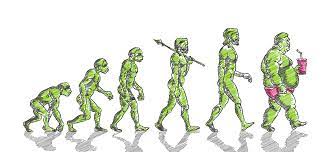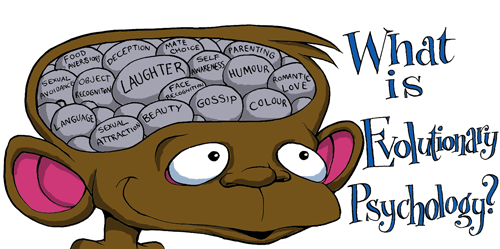The human brain is one of the most important parts of our body. It can think and feel, as well as experience different emotions. But how did it come to be this way? Scientists have found it hard to study how the brain evolved because it is so complex and different. But they can still study how our brains work under evolutionary psychology. This will help them to know more about why our brains are this way. In this article, we are going to talk about some important things. You might not have heard of them before – but they are important. We will talk about how the brain has changed over time because of evolution.
Contents
What is Evolutionary Psychology?

Evolutionary psychology is a way to think about how people behave. It says that natural selection shapes people’s behavior. In other words, it means we will be explaining what we do as relates to this process.
There is a new field of study called “evolutionary psychology.” It was invented by Edward Osborne Wilson in the 1960s. Evolutionary psychologists study how we think and feel at the deepest level. They look at what motivates us, our emotions, preferences, and even sexual behavior. This is different from other fields like anthropology or sociology that focus on other things. The main idea in this framework is that human thought processes have evolved so people can survive. This is because all living things, including humans, have to adapt to their environment in order to survive. This means they can reproduce and continue the species.
The Science Of Evolutionary Psychology
Evolutionary psychology is a type of biology that tries to tell people how certain behaviors came about. It also tells them where they come from. How did our brains evolve creatively? All people have problems understanding things. We are trying to understand them fully, which is not possible. The process of evolution has outfitted all people differently so they can fit into different environments more easily than others. This means that everyone sees the world differently depending on where they live or grew up. For instance, some cultures value aggression while other cultures view it as disrespectful behavior; Some people think they are in a group. But the groups don’t agree with it themselves. It is because of where they live and they have genes and biology. Evolutionary psychology tries to understand the differences in human behavior that stem from our brain’s past.
Basic Principles Of Evolutionary Psychology

Evolutionary psychology is a way to study how human beings have been shaped by evolution. We learn about this through our behavior, thoughts, and culture. It has its roots in Charles Darwin’s theory of natural selection. While evolutionary psychologists focus on human evolution, they are interested in understanding why humans behave the way they do. They do this because it helps them understand what behaviors were adaptive for early ancestors living during the Pleistocene era.
The best way to understand these hypotheses is through studying contemporary hunter-gatherer societies. Different countries have different ways of thinking about sexuality. These are things that are different in Bangladesh, Pakistan, Cameroon, Nigeria, Jamaica, Trinidad/Tobago. There are also differences between the United States and Uganda. In each culture, males are more eager for sexual activity than females. Men and women want different numbers of sex partners. One study found that men want more sex partners than women. This is a pattern in all the studies they studied.
What is Evolutionary Behavior?
All organisms are constantly evolving to survive in their environment. Birds, octopuses, and other animals have brains that work the same way as ours. But only people can think about how their behavior can affect future generations. But people do more than just think of what is realistic and comfortable. People also think about what might be possible, even if it is not true or good.
People were more successful at reproducing children who had better survival rates. This probably happened because of what people saw. We had big ambitions. We thought if we worked hard, did things just right, prayed harder than others. Maybe someday we could be like them too! This type of thinking has allowed us to evolve into one of the most successful species on the planet.
However, this same thought process has caused problems for us. This includes things like racism and sexism, or working too hard and spending too much money that can lead to early death. Yet despite this, many people still hold onto these concepts as if they were a part of human nature and some even argue that science has ‘proven’ them correct! This is most likely due to the fact that we are hardwired with an ability to understand how things work in order for us to survive, but sometimes forget or become confused by what actually helps us thrive.
What is Evolutionary Mismatch?

Many people, like myself included, are looking for meaning in their lives. We have the drive to seek out connections between our own behavior and the consequences that result from it. This is what makes us human beings.
This is also what evolutionary psychology tries to explain! The field of study focuses on our behaviors as they relate back to how we evolved over time. For instance, humans are social creatures with complex minds – but why? According to this school of thought, these traits developed because they helped early homo sapiens survive according to natural selection principles which favored them most given their environment at the time.
Concepts In Evolutionary Psychology
One of the most important concepts in evolutionary psychology is that our brains are wired to do things. There are certain parts of the brain that work together to give us an advantage when it comes to survival, but also creativity and problem-solving. The limbic system works with other areas like your cerebellum and basal ganglia so you can come up with creative solutions for problems over time. Scientists think this part evolved because individuals who could solve complex problems had more resources than those who couldn’t find ways around obstacles that might arise while they were hunting or gathering food or during battle. Another interesting concept is that we have what scientists call “mental modules” within different sections of the brain, including one dedicated specifically to socializing. This means that we are predisposed to being able to interact with others in ways that help us survive.
Another evolutionary psychology concept is the idea of “psychological tendencies.” This refers to our mind’s ability to fill things in automatically such as when you see a brick wall and assume it has windows even though they aren’t there, or how you can hear someone speaking another language but your brain will create words out of gibberish so you understand what is being said. Our brains also do this with numbers; no one actually knows why some people like odd and some like even (and most likely neither does anyone else). It might seem like these traits would be counterproductive for survival since if we saw everything as blank then we wouldn’t know what to act upon, but in our world today these tendencies are actually what makes us creative and able to find solutions for problems.
More Concepts
Evolutionary psychology also shows how men and women see things differently because of evolutionary development. For example, studies have shown that while both genders can read emotions on someone’s face just fine it is much easier for women than men to recognize expressions when there’s a change in the eyes or mouth. Men tend not to be very good at this which could explain why their brains evolved so they would focus more on other areas like recognizing changes in body language (and thus being better hunters). Women were gathered around fires cooking food making social gatherings necessary; male survival depended on them knowing who was friend or foe before they got too close.
Beyond these concepts, there are many others that scientists continue to study and figure out more about such as why our brains make us think we’re in love when really it is just a chemical reaction (and how soon after meeting someone you know if they will be your soul mate or not). These questions and more like them can all help people understand themselves better and once researchers learn the answers then maybe some of these psychological tendencies won’t seem so strange anymore.
What is the fight-or-flight response?

By evolutionary standards, it’s a pretty great response. When faced with threats to our survival (e.g., saber-toothed tigers), we produce stress hormones that increase blood flow and lung capacity and reduce immune function and nonessential processes like digestion. We become hypervigilant: details pop out of the background; time slows down; we feel pain more acutely while tuning everything else out — all biologically adaptive reactions in life-threatening situations.
What triggers fight or flight?
The amygdala is responsible for the fight-or-flight response. When activated, it triggers a cascade of other reactions, including activation of neurons in the hypothalamus that causes the production and release of stress hormones like cortisol and epinephrine (adrenaline). The hippocampus then records all this activity so we can remember what happened during moments when our life was at stake.
What are some evolutionary explanations about why humans have evolved creative brains?
Evolutionary psychologists argue that human creativity developed as adaptations to solve recurrent problems faced by our hunter-gatherer ancestors living on African savannahs 200,000 years ago. We needed to think flexibly to identify solutions—outrunning cheetahs or fashioning spears from sticks could require different problem-solving strategies, for example.
We also had to communicate information about these solutions without language or gestures that would have allowed our competitors (e.g., other tribes) to copy them and put us at a competitive disadvantage. This need may have favored the evolution of an ability to think outside of conventional boundaries in order to come up with novel ways of doing things, which is part of what we mean by creativity today—a concept only understood since the 19th century!
Why Evolutionary Psychology Is Controversial?

Although it has been around for several decades, evolutionary psychology is controversial. Some people criticize the discipline because they think that its explanations of human behavior are too biological and deterministic (i.e., we have no free will). Critics also argue that some findings in this field aren’t replicable and can be explained by more parsimonious approaches like social constructionism or sociobiology (which makes a lot less testable predictions than evolutionary psychology does).
However, almost all scientists agree on the importance of considering our biology when trying to understand how humans behave! After all, there is an entire branch of science devoted to studying what happens after natural selection “chooses” certain traits over others: namely, neuroscience. So, while evolutionary psychology isn’t perfect, it can play an important role in explaining certain aspects of human behavior.
Conclusion
Evolutionary psychology is not easy to understand. It can be complicated and hard for many people to grasp the concepts behind it. But, there are ways that you can use evolutionary psychological principles in your everyday life if you want them to work for you! One way is by using these tips when dating or trying to find a romantic partner. Another strategy would be making sure that your marketing strategies take into account how much attention span customers have on their devices has decreased over time due to an increase of information coming at us all day long through social media feeds, emails, texts, etc. This means that we need more creativity than ever before so make sure you create content worth reading now!
If you are looking for affordable Online Counseling MantraCare can help: Book a trial therapy session


